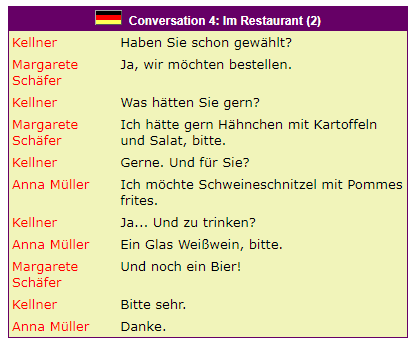
schon---already
Haben Sie schon gewählt?---Have you already chosen?
Wir möchten bestellen---"We would like to order." Note that - as in English - the infinitive of the verb "bestellen" comes at the end of the clause.
das Hähnchen---"Chicken". As this noun is another one which ends in "-chen", we know that it must be neuter.
die Kartoffel---potato
der Salat---salad; lettuce
gerne So far we have seen this word when a customer is saying what he or she would like. When spoken by a waiter, as here, it means "Of course!" or "You're welcome!"
Und für Sie?---And for you?
das Schwein---pig; pork
das Schnitzel---cutlet, chop
das Schweineschnitzel---"Pork cutlet, escalope of pork". This is another example of those compound nouns which are so common in German. Remember that the gender of the compound noun will always be determined by the last element - here "das Schnitzel".
Und zu trinken?---And to drink?
ein Glas Weißwein---"A glass of white wine". "Weißwein" is another compound noun, coming from "weiß", the adjective for "white" and "der Wein" (= wine).
noch---still; yet
noch ein Bier---"Another beer". You would say "eine" for a feminine noun. So "another cup of tea" would be "Noch eine Tasse Tee".
bitte sehr---Yet another nuance of "bitte"! Although the waiter isn't actually bringing them anything, he still says "bitte sehr" to confirm the transaction.
 英语
英语 日语
日语 韩语
韩语 法语
法语 西班牙语
西班牙语 意大利语
意大利语 阿拉伯语
阿拉伯语 葡萄牙语
葡萄牙语 越南语
越南语 俄语
俄语 芬兰语
芬兰语 泰语
泰语 丹麦语
丹麦语 对外汉语
对外汉语

